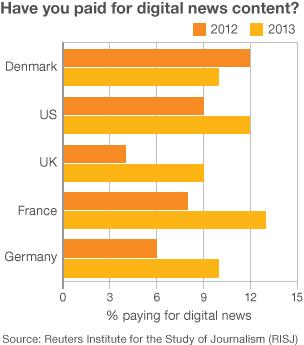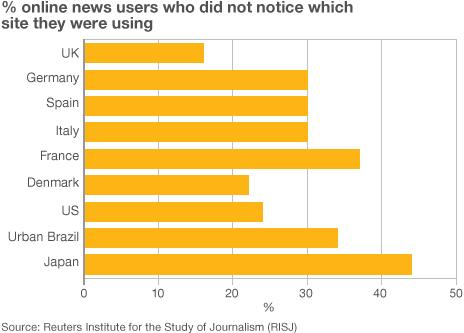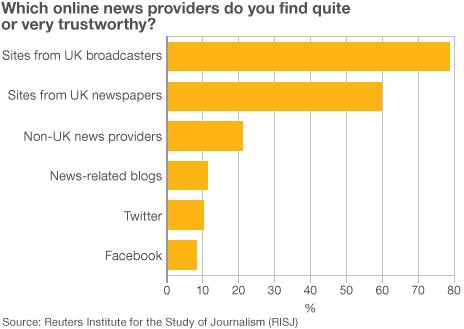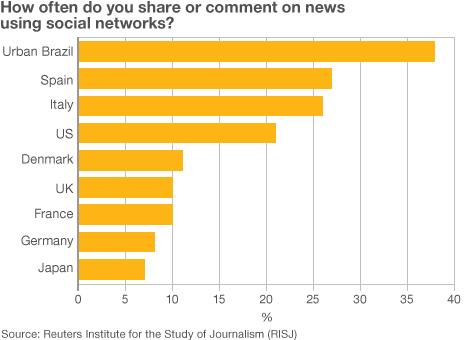Online news is becoming easier to sell, suggests study
- Published
- comments

The Sun's online site is to follow stable-mate the Times's lead by erecting a paywall
Consumers are becoming more willing to pay for online news, although most still choose not to, a study suggests.
The percentage of UK-based web users who read paid-for content had more than doubled to 9% during the past 10 months, it said, external.
Gains were also seen in the US, France and Germany, although Denmark bucked the trend.
Those aged 25 to 34 appeared most prepared to pay, and men were more willing than women, the study suggests.
The research will be of particular interest to newspapers, including the Sun, Daily Telegraph, Bild and Washington Post, which are all constructing paywalls this year.
Valued analysis
The researchers said that in the US, ownership of a tablet or smartphone appeared to encourage payments - particularly if the devices were made by Apple.
However, they cautioned that the effect was less pronounced in the UK - possibly because so many news apps in the country were offered for free - and that some types of publication found it easier than others.

"The data indicate, on average, 10% of people have paid for news in some digital form - about one-third higher than last year," said Prof Robert Picard, director of research at the Reuters Institute for the Study of Journalism, which carried out the study.
"Public-affairs magazines are finding it easier to get the public to pay than newspapers, especially on tablets, because digital payments for magazines are becoming the norm and they offer news analysis and commentary in ways general news sources do not."
Yahoo's influence
More than 11,000 people across nine countries took part in the online poll on which the study was based. The BBC, Google and the media regulator Ofcom were among its sponsors.
Respondents were most likely to say that the internet had become their most important source of news in Spain, Italy, Japan and urban Brazil.
But TV still had the upper hand in Germany, France, Denmark, the UK and US.
However, that picture changed among the young - in all the countries except France the under-35s said that they favoured online news sources, while the over-45s strongly preferred television.

The survey suggests tablet owners are more willing to pay for news than others
The survey also indicated that newer brands had sometimes leapfrogged older ones.
In the US and Japan, Yahoo was identified as the most popular online news source, leaving the most popular offline providers - Fox News and Tokyo-based broadcaster NHK - lagging behind.
Despite the wide range of options, the study found most participants only used a small number of sources, suggesting that brands did still play an important role.
News chiefs may be concerned, however, at the number who said they did not really notice which sites they were using and just looked at news that interested them - at least 30% of respondents from Germany, Spain, Italy, France, urban Brazil and Japan agreed with this statement.

"One key factor in reducing brand recognition appears to be social media," added the report's editor, Nic Newman.
"Heavy social media users in the UK are more likely to agree that they don't notice which sites they are using."
Posts and tweets
The study confirms the growing importance of Facebook, Twitter and other social media services, noting that more than a third of respondents classed them as their main source of news in Italy, Spain and urban Brazil.
Their influence was particularly pronounced among the young. For the under-35s social media was now the most common way a news story was discovered online, the data suggested, while for other ages it remained search.
But just because more people are using social media, it does not mean they are likely to believe what they read on it.
In the UK, sites from newspapers and broadcasters were judged to be either "very" or "quite" trustworthy by most respondents. By contrast, only a fraction said the same for Twitter and Facebook.

Even so, Mr Newman warned the older players not to become complacent.
"A strong name and long heritage is no longer enough," he said.

Social media and blogs were particularly popular in Spain and urban Brazil as a source of news
"Our data show that there still is a yearning - in an ocean of content - for trusted news across a range of subject areas, but newer brands like Yahoo and the Huffington Post are also proving they can fill that role alongside a raft of specialist providers, blogs, and social media too."
As for being willing to comment about stories on a social network, the study's authors believed that cultural factors seemed to be the biggest factor.
So, it was the Latin countries - Brazil, Spain and Italy - where users were most likely to share their thoughts.
But they were much less likely to post comments in Japan or the northern European countries - Germany, France, the UK and Denmark.

- Published27 March 2013
- Published26 March 2013
- Published7 February 2013